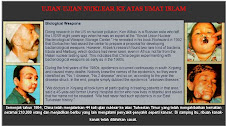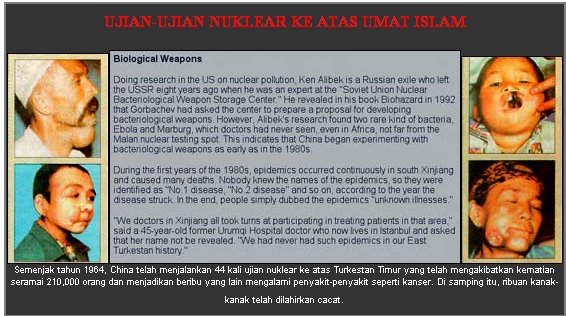Uyghurs Killed in Raid
China kills two "terrorists" in "Xinjiang" raid
BEIJING, Feb 18 (Reuters) - Chinese police shot and killed two members of a "terrorist gang" and rounded up 15 others during a raid last month in the restive northwestern Muslim region of Xinjiang, the official Xinhua news agency said on Monday.
The arrests came less than seven months before the Beijing Olympics, which open on Aug. 8.
Five policemen were wounded in the raid on Jan. 27 when three homemade grenades were hurled at them, Xinhua said. Police arrested 15 members of the group in the operation in the regional capital Urumqi.
Six of the arrested members of the group were wounded in the gunfight, Xinhua said, adding that police had seized "knives, axes and books about terrorism" from them.
Xinhua cited unnamed senior Xinjiang officials as vowing to step up their crackdown on militant activities "to ensure the safety of the upcoming Olympic Games".
"(The) masterminds behind such activities (will) face the toughest punishment according to the law," Xinhua paraphrased the officials as saying.
Xinhua said in a separate report on Monday that Chinese soldiers would be given more extensive anti-terrorism training to deal with risks such as nuclear and biochemical threats, during the Games.
Xinhua cited unnamed sources as saying that initial investigations showed the group had set up a stronghold in Urumqi last August and had collaborated with the East Turkestan Islamic Movement (ETIM), which the United Nations added to its list of terrorist organisations in 2002.
China has waged a heavy-handed campaign against what it calls violent separatist activities by Uighur Muslims agitating for an independent East Turkestan State in the oil-rich Xinjiang region that borders Pakistan, Afghanistan and Central Asia.
In January 2007, Chinese forces killed 18 people described as terrorists in a gun battle in Xinjiang. One policeman was killed and another wounded in the raid on a training camp in the mountains of the Pamirs plateau in southern Xinjiang.
A police spokeswoman said at the time that the training camp was run by ETIM.
China has accused Uighur militants of staging a series of terrorist attacks on Chinese civilians since the 1990s and has hinted at their links with al Qaeda, but rights groups say Beijing is using its support for the U.S.-led "war on terror" to justify a crackdown on Uighurs.
Xinjiang is home to 8 million Uighurs, a Turkic, largely Islamic people who share linguistic and cultural bonds with Central Asia. Many resent the growing Han Chinese economic dominance in Xinjiang, as well as government controls on religion and culture.
The arrests came less than seven months before the Beijing Olympics, which open on Aug. 8.
Five policemen were wounded in the raid on Jan. 27 when three homemade grenades were hurled at them, Xinhua said. Police arrested 15 members of the group in the operation in the regional capital Urumqi.
Six of the arrested members of the group were wounded in the gunfight, Xinhua said, adding that police had seized "knives, axes and books about terrorism" from them.
Xinhua cited unnamed senior Xinjiang officials as vowing to step up their crackdown on militant activities "to ensure the safety of the upcoming Olympic Games".
"(The) masterminds behind such activities (will) face the toughest punishment according to the law," Xinhua paraphrased the officials as saying.
Xinhua said in a separate report on Monday that Chinese soldiers would be given more extensive anti-terrorism training to deal with risks such as nuclear and biochemical threats, during the Games.
Xinhua cited unnamed sources as saying that initial investigations showed the group had set up a stronghold in Urumqi last August and had collaborated with the East Turkestan Islamic Movement (ETIM), which the United Nations added to its list of terrorist organisations in 2002.
China has waged a heavy-handed campaign against what it calls violent separatist activities by Uighur Muslims agitating for an independent East Turkestan State in the oil-rich Xinjiang region that borders Pakistan, Afghanistan and Central Asia.
In January 2007, Chinese forces killed 18 people described as terrorists in a gun battle in Xinjiang. One policeman was killed and another wounded in the raid on a training camp in the mountains of the Pamirs plateau in southern Xinjiang.
A police spokeswoman said at the time that the training camp was run by ETIM.
China has accused Uighur militants of staging a series of terrorist attacks on Chinese civilians since the 1990s and has hinted at their links with al Qaeda, but rights groups say Beijing is using its support for the U.S.-led "war on terror" to justify a crackdown on Uighurs.
Xinjiang is home to 8 million Uighurs, a Turkic, largely Islamic people who share linguistic and cultural bonds with Central Asia. Many resent the growing Han Chinese economic dominance in Xinjiang, as well as government controls on religion and culture.
China Executes Two Uyghurs
Authorities in Xinjiang execute two Uyghurs for alleged terror links. Fifteen others are sentenced.
CORRECTS AND CLARIFIES TRIAL DATE AND CHINESE LEGAL PROCEDURE.WASHINGTON—Chinese authorities in the northwestern region of Xinjiang have executed two ethnic minority Uyghurs and sentenced 15 others for alleged terrorist links, according to local sources.Mukhtar Setiwaldi and Abduweli Imin were originally handed death sentences by the Kashgar Intermediate People’s Court on Nov. 9, 2007, according to a Nov. 11, 2007 report by China's official Xinhua news agency. Referring to them by their Chinese names, Xinhua said Muhetaer Setiwalidi and Abuduwaili Yiming were sentenced to death for separatist activities, training at a terrorist camp, and illegally manufacturing explosives.They were sent to be executed after a public announcement of their sentences July 9 in Yengi Sheher county, Kashgar, Uyghur sources and a local official said.Authorities ordered county residents to attend the meeting but police banned cameras, lighters, and recording devices, the sources told RFA’s Uyghur service.Authorities announced that three other Uyghurs had been handed two-year suspended death sentences and the rest were sentenced to jail terms ranging from 10 years to life, the sources said. All 17 defendants were charged as members of the East Turkistan Islamic Movement (ETIM), which Beijing accuses of terrorist ties. ETIM denies the allegation.Prosecutors argued at trial that the men had engaged in separatist activities from August 2005 until their arrest in January 2007. According to Xinhua, they made 67 grenades and two bombs that could be used for suicide attacks. They also acquired 16 kilos of explosives, the news agency said.No details were immediately available about the defendants' appeal, which is automatic in capital convictions under Chinese law, or the approval of their sentence by the Supreme People's Court (SPC), which is required under a legal amendment that took effect on Jan. 1, 2007.The SPC was responsible for reviewing all capital cases until 1983, when provincial courts were authorized to have the final say in death-penalty cases as part of a major anti-crime campaign.“It was an open meeting,” one official at the Yengi Sheher county court said. “The Kashgar Intermediate People's Court was responsible for the case. Our duty was to provide a place for this open meeting. I am not authorized to speak about it. The Kashgar Intermediate Court officials can give you detailed information.”Officials at Kashgar Intermediate Court, contacted by telephone, declined to comment.‘Political criminals’“I participated in the open meeting,” one Uyghur woman said. “Seventeen people were sentenced. All of them were political criminals. At the open trial, the authorities announced that these people were terrorists who took part in the Aktu incident and some of them donated money.”The “Aktu incident” refers to a Chinese raid on what authorities described as a terrorist camp in the Pamir mountains, in Aktu county, in January 2007. Authorities claimed to have killed 18 ETIM members and arrested 17.“There were a lot of people. About 10,000 people attended the open meeting,” she said. “The parents and relatives of the defendants weren’t allowed to attend. Members of the village committees, students, teachers, and government employees were allowed to attend.”“One of the defendants shouted a slogan as he was being taken away—he raised his fist and shouted—but I couldn’t hear what he said,” another woman who watched the trial said.Earlier incidentThe meeting came a day after police used smoke to force open a flat where 15 Uyghurs were staying in the Xinjiang capital, Urumqi, before shooting dead five Uyghurs inside who the official media said were planning a “holy war,” witnesses and official media said.“The injured were sent to hospital and the other nine people were captured,” the official Xinhua news agency quoted a police officer as saying. “The suspects confessed they had all received training on the launching of a ‘holy war.’ Their aim was to kill Han people, the most populous ethnic group in China whom they took as heretics, and found their own state.”Uyghurs, like Tibetans, have a long history under Beijing’s heavy-handed rule which has at times erupted in violence. But exiled Uyghurs deny the existence of an organized terrorist campaign and say previous incidents have been fabricated or exaggerated to secure international support for a crackdown.In March, Chinese authorities said they had broken up and arrested members of a group that were threatening to sabotage the Beijing Olympics.China has waged a campaign over the last decade against what it says are violent separatists and Islamic extremists who aim to establish an independent state in the Xinjiang Uyghur Autonomous Region, which shares a border with Afghanistan, Pakistan, Tajikistan, Kyrgyzstan, Kazakhstan, Russia, and Mongolia.After the Sept. 11, 2001 attacks on the United States, Beijing took the position that Uyghur groups were connected with al-Qaeda and that ETIM was a “major component of the terrorist network headed by Osama bin Laden.” ETIM has denied that charge.
Background of 1997 Gulja ( Yining ) City Massacre in East Turkestan!
Amnesty International (AI), 1 February 2007- (10 years ago) On 5 February 1997, dozens of people were killed or seriously injured when the Chinese security forces brutally broke up a peaceful demonstration in the city of Gulja (Yining) in the Xinjiang Uighur Autonomous Region (XUAR) of China. Hundreds, possibly thousands, lost their lives or were seriously injured in the unrest that occurred the following day. Large numbers of people were arrested during the demonstrations and their aftermath. Many detainees were beaten or otherwise tortured. An unknown number remain unaccounted for. Uighurs are a mainly Muslim ethnic minority who are concentrated primarily in China’s Xinjiang Uighur Autonomous Region (XUAR). Since the 1980s, the Uighurs have been the target of systematic and extensive human rights violations. This includes arbitrary detention and imprisonment, incommunicado detention, and serious restrictions on religious freedom as well as cultural and social rights. Uighur political prisoners have been executed after unfair trials. In recent years, China has exploited the international “war on terror” to suppress the Uighurs, labelling them “terrorists”, “separatists”, or “religious extremists”.








No comments:
Post a Comment